Organizational Behaviour Report: Leadership, Motivation, Tesco
VerifiedAdded on 2021/02/19
|19
|5024
|108
Report
AI Summary
This report provides an in-depth analysis of organizational behaviour within Tesco, a multinational retail company. It explores the influence of power, culture, and politics on employee and team performance, utilizing Handy's Model to assess different organizational cultures. The report delves into motivation theories, including Maslow's Hierarchy of Needs and Herzberg's Two-Factor Theory, to explain how motivation contributes to achieving organizational goals. Furthermore, it examines strategies for effective team collaboration, referencing Tuckman's theory, and applies various organizational behaviour concepts to the Tesco context. The report recommends specific cultural approaches and leadership styles to enhance employee satisfaction, improve decision-making, and boost overall productivity within the company. This comprehensive analysis aims to provide insights into the practical application of organizational behaviour principles within a real-world business environment.
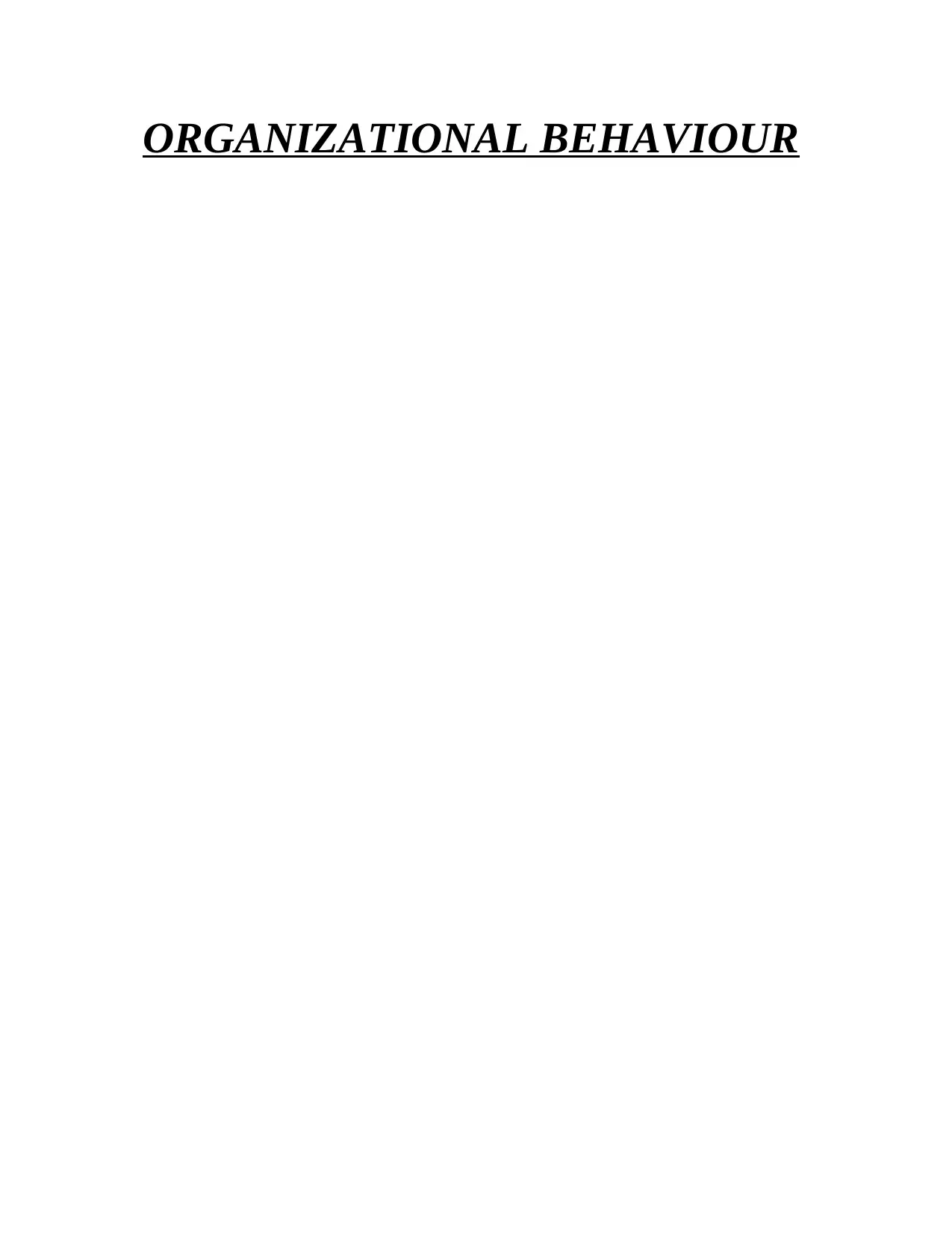
ORGANIZATIONAL BEHAVIOUR
Paraphrase This Document
Need a fresh take? Get an instant paraphrase of this document with our AI Paraphraser
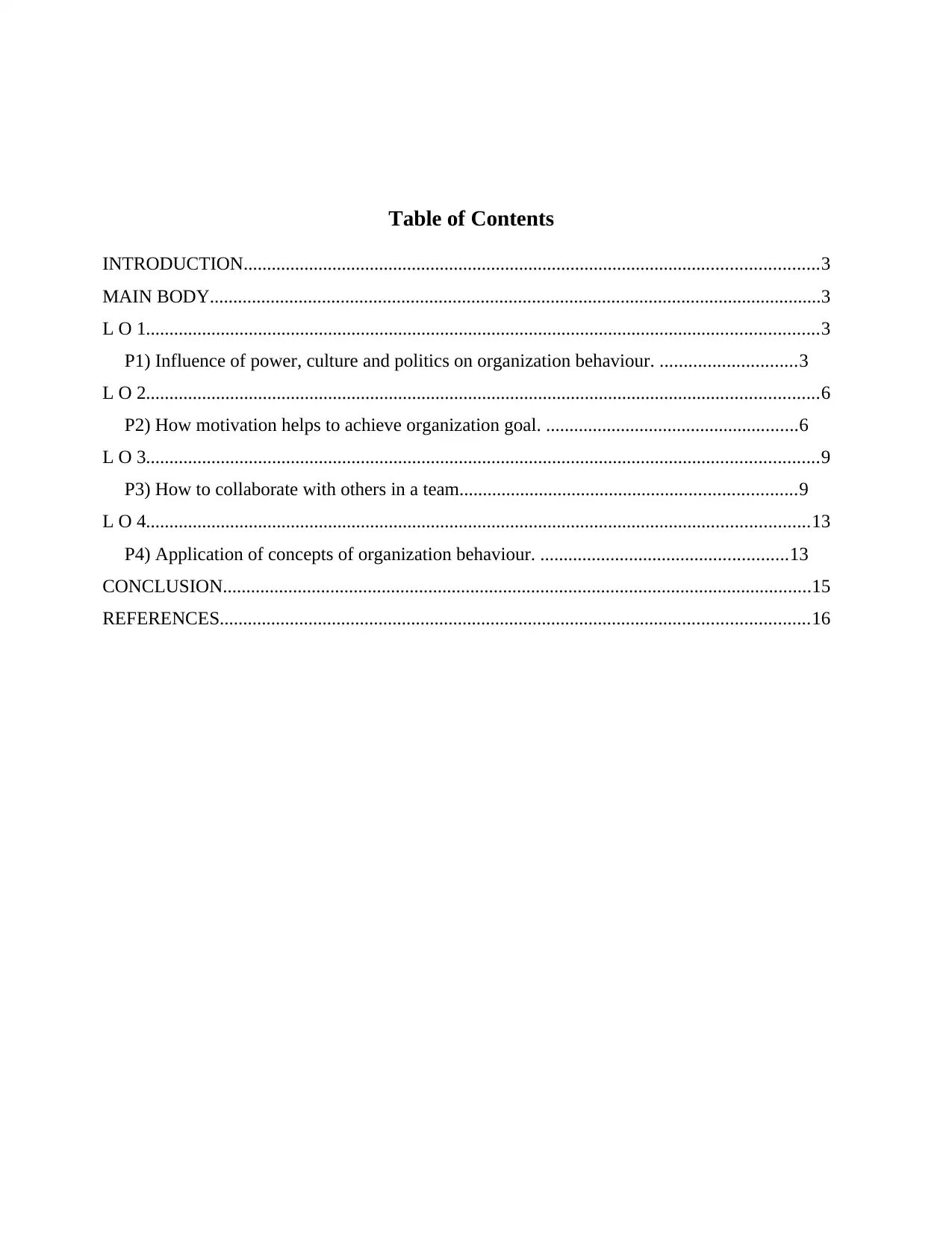
Table of Contents
INTRODUCTION...........................................................................................................................3
MAIN BODY...................................................................................................................................3
L O 1................................................................................................................................................3
P1) Influence of power, culture and politics on organization behaviour. .............................3
L O 2................................................................................................................................................6
P2) How motivation helps to achieve organization goal. ......................................................6
L O 3................................................................................................................................................9
P3) How to collaborate with others in a team........................................................................9
L O 4..............................................................................................................................................13
P4) Application of concepts of organization behaviour. .....................................................13
CONCLUSION..............................................................................................................................15
REFERENCES..............................................................................................................................16
INTRODUCTION...........................................................................................................................3
MAIN BODY...................................................................................................................................3
L O 1................................................................................................................................................3
P1) Influence of power, culture and politics on organization behaviour. .............................3
L O 2................................................................................................................................................6
P2) How motivation helps to achieve organization goal. ......................................................6
L O 3................................................................................................................................................9
P3) How to collaborate with others in a team........................................................................9
L O 4..............................................................................................................................................13
P4) Application of concepts of organization behaviour. .....................................................13
CONCLUSION..............................................................................................................................15
REFERENCES..............................................................................................................................16
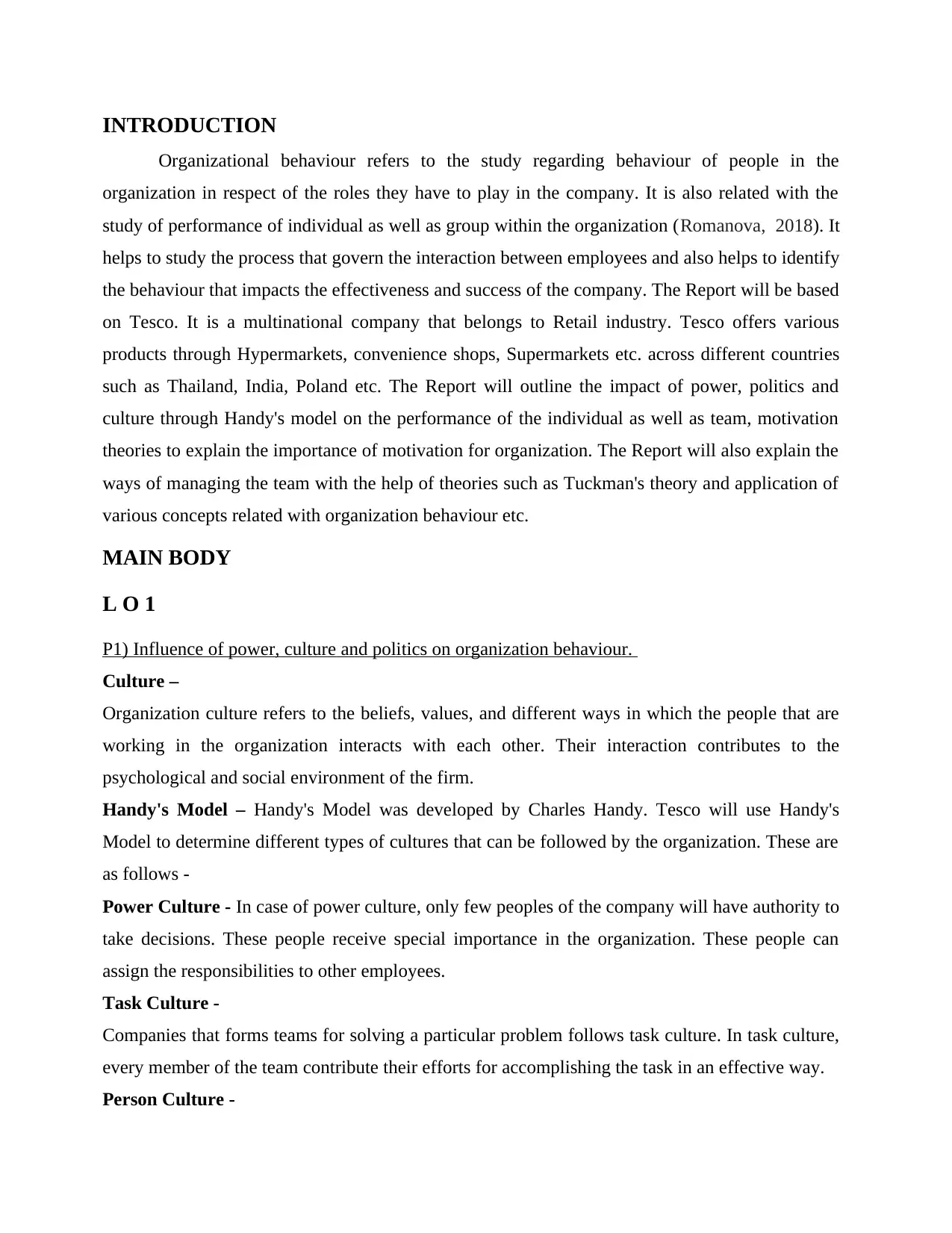
INTRODUCTION
Organizational behaviour refers to the study regarding behaviour of people in the
organization in respect of the roles they have to play in the company. It is also related with the
study of performance of individual as well as group within the organization (Romanova, 2018). It
helps to study the process that govern the interaction between employees and also helps to identify
the behaviour that impacts the effectiveness and success of the company. The Report will be based
on Tesco. It is a multinational company that belongs to Retail industry. Tesco offers various
products through Hypermarkets, convenience shops, Supermarkets etc. across different countries
such as Thailand, India, Poland etc. The Report will outline the impact of power, politics and
culture through Handy's model on the performance of the individual as well as team, motivation
theories to explain the importance of motivation for organization. The Report will also explain the
ways of managing the team with the help of theories such as Tuckman's theory and application of
various concepts related with organization behaviour etc.
MAIN BODY
L O 1
P1) Influence of power, culture and politics on organization behaviour.
Culture –
Organization culture refers to the beliefs, values, and different ways in which the people that are
working in the organization interacts with each other. Their interaction contributes to the
psychological and social environment of the firm.
Handy's Model – Handy's Model was developed by Charles Handy. Tesco will use Handy's
Model to determine different types of cultures that can be followed by the organization. These are
as follows -
Power Culture - In case of power culture, only few peoples of the company will have authority to
take decisions. These people receive special importance in the organization. These people can
assign the responsibilities to other employees.
Task Culture -
Companies that forms teams for solving a particular problem follows task culture. In task culture,
every member of the team contribute their efforts for accomplishing the task in an effective way.
Person Culture -
Organizational behaviour refers to the study regarding behaviour of people in the
organization in respect of the roles they have to play in the company. It is also related with the
study of performance of individual as well as group within the organization (Romanova, 2018). It
helps to study the process that govern the interaction between employees and also helps to identify
the behaviour that impacts the effectiveness and success of the company. The Report will be based
on Tesco. It is a multinational company that belongs to Retail industry. Tesco offers various
products through Hypermarkets, convenience shops, Supermarkets etc. across different countries
such as Thailand, India, Poland etc. The Report will outline the impact of power, politics and
culture through Handy's model on the performance of the individual as well as team, motivation
theories to explain the importance of motivation for organization. The Report will also explain the
ways of managing the team with the help of theories such as Tuckman's theory and application of
various concepts related with organization behaviour etc.
MAIN BODY
L O 1
P1) Influence of power, culture and politics on organization behaviour.
Culture –
Organization culture refers to the beliefs, values, and different ways in which the people that are
working in the organization interacts with each other. Their interaction contributes to the
psychological and social environment of the firm.
Handy's Model – Handy's Model was developed by Charles Handy. Tesco will use Handy's
Model to determine different types of cultures that can be followed by the organization. These are
as follows -
Power Culture - In case of power culture, only few peoples of the company will have authority to
take decisions. These people receive special importance in the organization. These people can
assign the responsibilities to other employees.
Task Culture -
Companies that forms teams for solving a particular problem follows task culture. In task culture,
every member of the team contribute their efforts for accomplishing the task in an effective way.
Person Culture -
⊘ This is a preview!⊘
Do you want full access?
Subscribe today to unlock all pages.

Trusted by 1+ million students worldwide
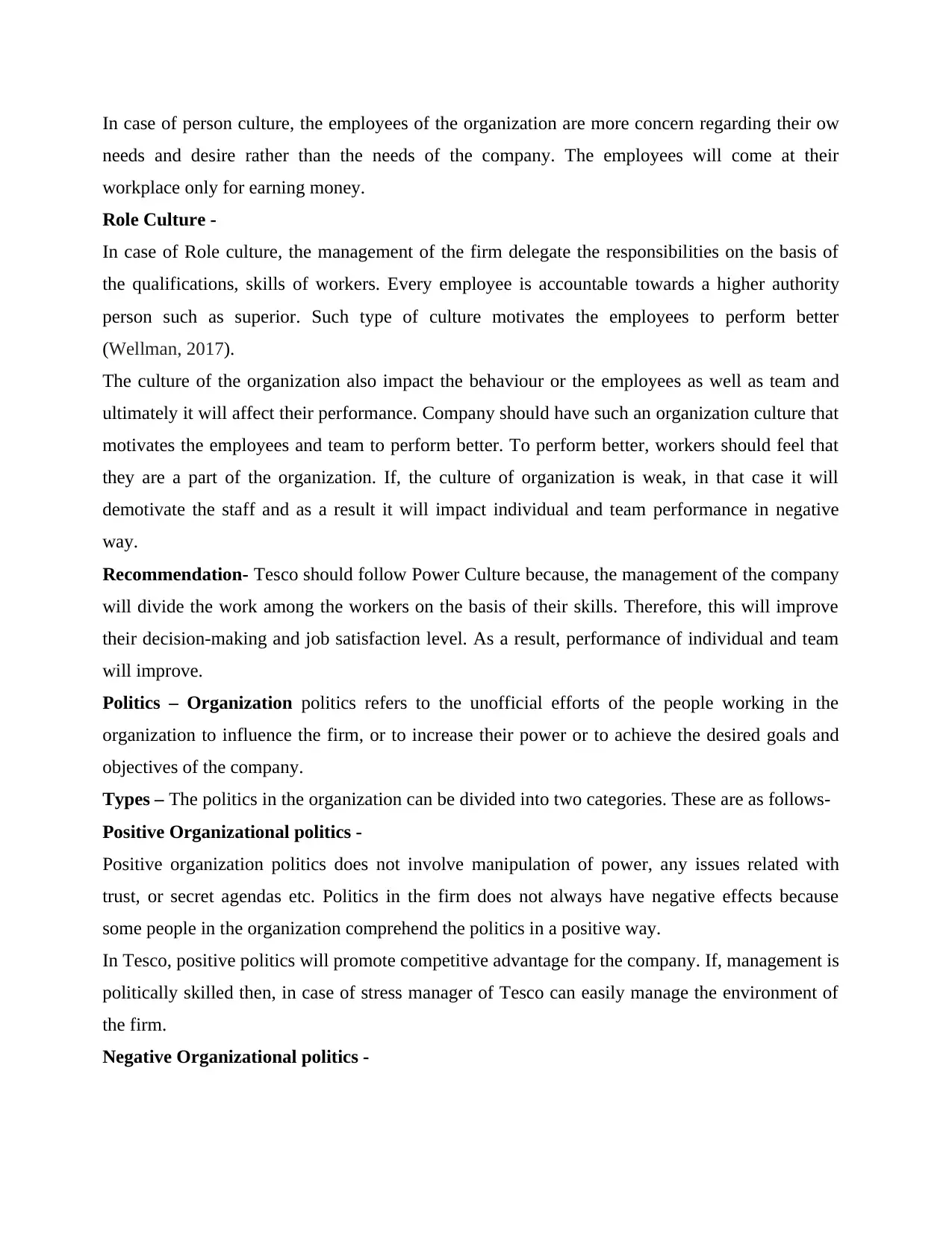
In case of person culture, the employees of the organization are more concern regarding their ow
needs and desire rather than the needs of the company. The employees will come at their
workplace only for earning money.
Role Culture -
In case of Role culture, the management of the firm delegate the responsibilities on the basis of
the qualifications, skills of workers. Every employee is accountable towards a higher authority
person such as superior. Such type of culture motivates the employees to perform better
(Wellman, 2017).
The culture of the organization also impact the behaviour or the employees as well as team and
ultimately it will affect their performance. Company should have such an organization culture that
motivates the employees and team to perform better. To perform better, workers should feel that
they are a part of the organization. If, the culture of organization is weak, in that case it will
demotivate the staff and as a result it will impact individual and team performance in negative
way.
Recommendation- Tesco should follow Power Culture because, the management of the company
will divide the work among the workers on the basis of their skills. Therefore, this will improve
their decision-making and job satisfaction level. As a result, performance of individual and team
will improve.
Politics – Organization politics refers to the unofficial efforts of the people working in the
organization to influence the firm, or to increase their power or to achieve the desired goals and
objectives of the company.
Types – The politics in the organization can be divided into two categories. These are as follows-
Positive Organizational politics -
Positive organization politics does not involve manipulation of power, any issues related with
trust, or secret agendas etc. Politics in the firm does not always have negative effects because
some people in the organization comprehend the politics in a positive way.
In Tesco, positive politics will promote competitive advantage for the company. If, management is
politically skilled then, in case of stress manager of Tesco can easily manage the environment of
the firm.
Negative Organizational politics -
needs and desire rather than the needs of the company. The employees will come at their
workplace only for earning money.
Role Culture -
In case of Role culture, the management of the firm delegate the responsibilities on the basis of
the qualifications, skills of workers. Every employee is accountable towards a higher authority
person such as superior. Such type of culture motivates the employees to perform better
(Wellman, 2017).
The culture of the organization also impact the behaviour or the employees as well as team and
ultimately it will affect their performance. Company should have such an organization culture that
motivates the employees and team to perform better. To perform better, workers should feel that
they are a part of the organization. If, the culture of organization is weak, in that case it will
demotivate the staff and as a result it will impact individual and team performance in negative
way.
Recommendation- Tesco should follow Power Culture because, the management of the company
will divide the work among the workers on the basis of their skills. Therefore, this will improve
their decision-making and job satisfaction level. As a result, performance of individual and team
will improve.
Politics – Organization politics refers to the unofficial efforts of the people working in the
organization to influence the firm, or to increase their power or to achieve the desired goals and
objectives of the company.
Types – The politics in the organization can be divided into two categories. These are as follows-
Positive Organizational politics -
Positive organization politics does not involve manipulation of power, any issues related with
trust, or secret agendas etc. Politics in the firm does not always have negative effects because
some people in the organization comprehend the politics in a positive way.
In Tesco, positive politics will promote competitive advantage for the company. If, management is
politically skilled then, in case of stress manager of Tesco can easily manage the environment of
the firm.
Negative Organizational politics -
Paraphrase This Document
Need a fresh take? Get an instant paraphrase of this document with our AI Paraphraser
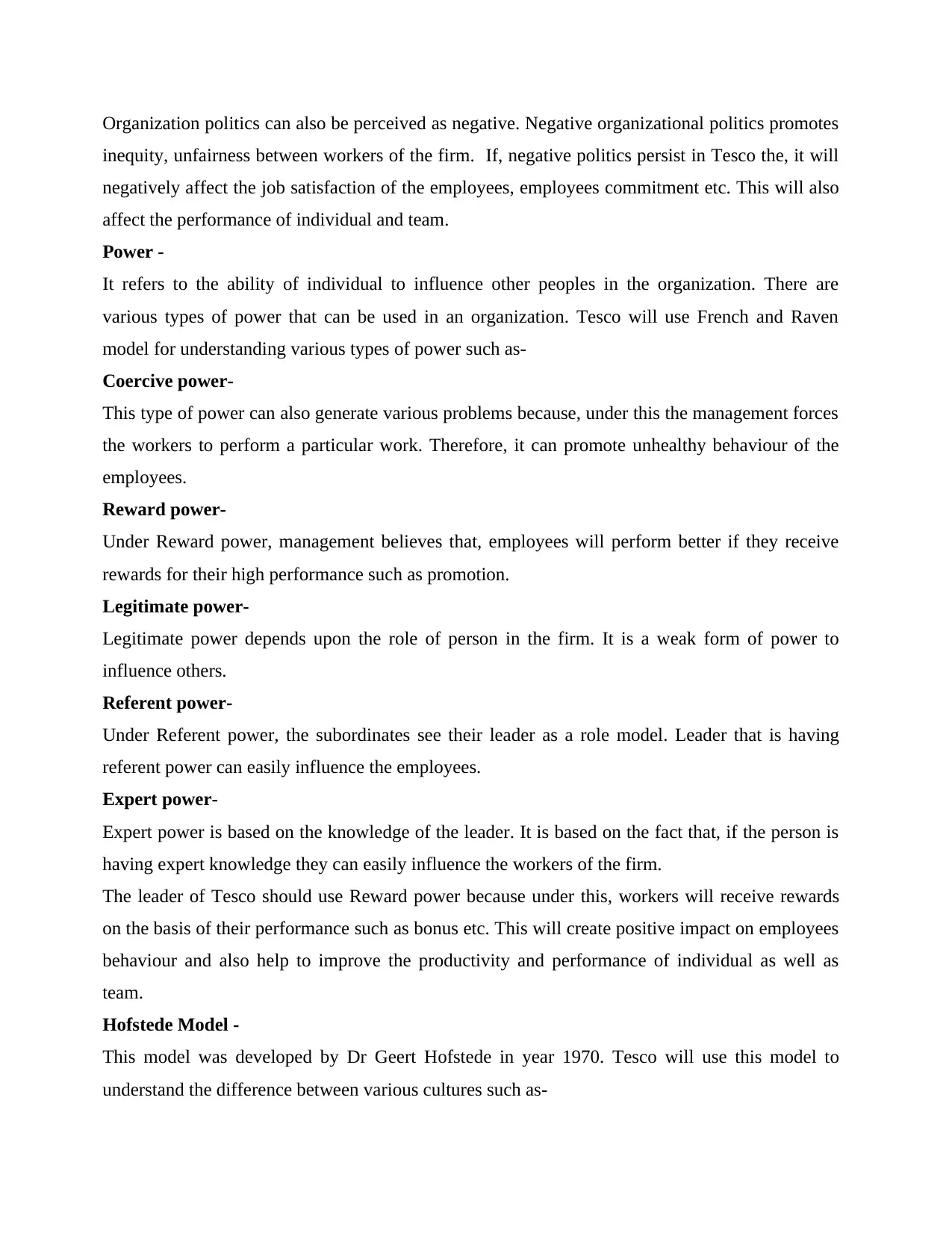
Organization politics can also be perceived as negative. Negative organizational politics promotes
inequity, unfairness between workers of the firm. If, negative politics persist in Tesco the, it will
negatively affect the job satisfaction of the employees, employees commitment etc. This will also
affect the performance of individual and team.
Power -
It refers to the ability of individual to influence other peoples in the organization. There are
various types of power that can be used in an organization. Tesco will use French and Raven
model for understanding various types of power such as-
Coercive power-
This type of power can also generate various problems because, under this the management forces
the workers to perform a particular work. Therefore, it can promote unhealthy behaviour of the
employees.
Reward power-
Under Reward power, management believes that, employees will perform better if they receive
rewards for their high performance such as promotion.
Legitimate power-
Legitimate power depends upon the role of person in the firm. It is a weak form of power to
influence others.
Referent power-
Under Referent power, the subordinates see their leader as a role model. Leader that is having
referent power can easily influence the employees.
Expert power-
Expert power is based on the knowledge of the leader. It is based on the fact that, if the person is
having expert knowledge they can easily influence the workers of the firm.
The leader of Tesco should use Reward power because under this, workers will receive rewards
on the basis of their performance such as bonus etc. This will create positive impact on employees
behaviour and also help to improve the productivity and performance of individual as well as
team.
Hofstede Model -
This model was developed by Dr Geert Hofstede in year 1970. Tesco will use this model to
understand the difference between various cultures such as-
inequity, unfairness between workers of the firm. If, negative politics persist in Tesco the, it will
negatively affect the job satisfaction of the employees, employees commitment etc. This will also
affect the performance of individual and team.
Power -
It refers to the ability of individual to influence other peoples in the organization. There are
various types of power that can be used in an organization. Tesco will use French and Raven
model for understanding various types of power such as-
Coercive power-
This type of power can also generate various problems because, under this the management forces
the workers to perform a particular work. Therefore, it can promote unhealthy behaviour of the
employees.
Reward power-
Under Reward power, management believes that, employees will perform better if they receive
rewards for their high performance such as promotion.
Legitimate power-
Legitimate power depends upon the role of person in the firm. It is a weak form of power to
influence others.
Referent power-
Under Referent power, the subordinates see their leader as a role model. Leader that is having
referent power can easily influence the employees.
Expert power-
Expert power is based on the knowledge of the leader. It is based on the fact that, if the person is
having expert knowledge they can easily influence the workers of the firm.
The leader of Tesco should use Reward power because under this, workers will receive rewards
on the basis of their performance such as bonus etc. This will create positive impact on employees
behaviour and also help to improve the productivity and performance of individual as well as
team.
Hofstede Model -
This model was developed by Dr Geert Hofstede in year 1970. Tesco will use this model to
understand the difference between various cultures such as-
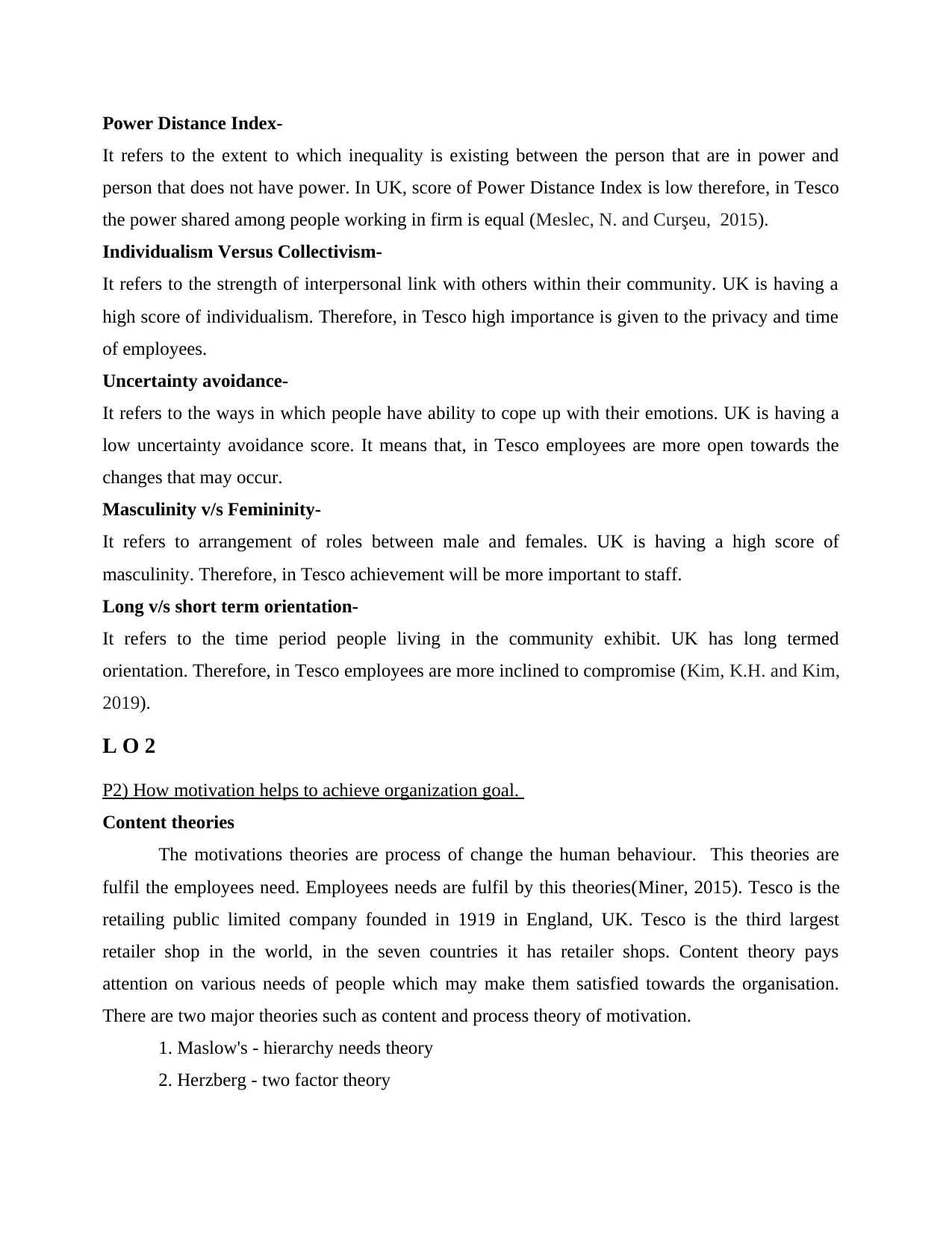
Power Distance Index-
It refers to the extent to which inequality is existing between the person that are in power and
person that does not have power. In UK, score of Power Distance Index is low therefore, in Tesco
the power shared among people working in firm is equal (Meslec, N. and Curşeu, 2015).
Individualism Versus Collectivism-
It refers to the strength of interpersonal link with others within their community. UK is having a
high score of individualism. Therefore, in Tesco high importance is given to the privacy and time
of employees.
Uncertainty avoidance-
It refers to the ways in which people have ability to cope up with their emotions. UK is having a
low uncertainty avoidance score. It means that, in Tesco employees are more open towards the
changes that may occur.
Masculinity v/s Femininity-
It refers to arrangement of roles between male and females. UK is having a high score of
masculinity. Therefore, in Tesco achievement will be more important to staff.
Long v/s short term orientation-
It refers to the time period people living in the community exhibit. UK has long termed
orientation. Therefore, in Tesco employees are more inclined to compromise (Kim, K.H. and Kim,
2019).
L O 2
P2) How motivation helps to achieve organization goal.
Content theories
The motivations theories are process of change the human behaviour. This theories are
fulfil the employees need. Employees needs are fulfil by this theories(Miner, 2015). Tesco is the
retailing public limited company founded in 1919 in England, UK. Tesco is the third largest
retailer shop in the world, in the seven countries it has retailer shops. Content theory pays
attention on various needs of people which may make them satisfied towards the organisation.
There are two major theories such as content and process theory of motivation.
1. Maslow's - hierarchy needs theory
2. Herzberg - two factor theory
It refers to the extent to which inequality is existing between the person that are in power and
person that does not have power. In UK, score of Power Distance Index is low therefore, in Tesco
the power shared among people working in firm is equal (Meslec, N. and Curşeu, 2015).
Individualism Versus Collectivism-
It refers to the strength of interpersonal link with others within their community. UK is having a
high score of individualism. Therefore, in Tesco high importance is given to the privacy and time
of employees.
Uncertainty avoidance-
It refers to the ways in which people have ability to cope up with their emotions. UK is having a
low uncertainty avoidance score. It means that, in Tesco employees are more open towards the
changes that may occur.
Masculinity v/s Femininity-
It refers to arrangement of roles between male and females. UK is having a high score of
masculinity. Therefore, in Tesco achievement will be more important to staff.
Long v/s short term orientation-
It refers to the time period people living in the community exhibit. UK has long termed
orientation. Therefore, in Tesco employees are more inclined to compromise (Kim, K.H. and Kim,
2019).
L O 2
P2) How motivation helps to achieve organization goal.
Content theories
The motivations theories are process of change the human behaviour. This theories are
fulfil the employees need. Employees needs are fulfil by this theories(Miner, 2015). Tesco is the
retailing public limited company founded in 1919 in England, UK. Tesco is the third largest
retailer shop in the world, in the seven countries it has retailer shops. Content theory pays
attention on various needs of people which may make them satisfied towards the organisation.
There are two major theories such as content and process theory of motivation.
1. Maslow's - hierarchy needs theory
2. Herzberg - two factor theory
⊘ This is a preview!⊘
Do you want full access?
Subscribe today to unlock all pages.

Trusted by 1+ million students worldwide
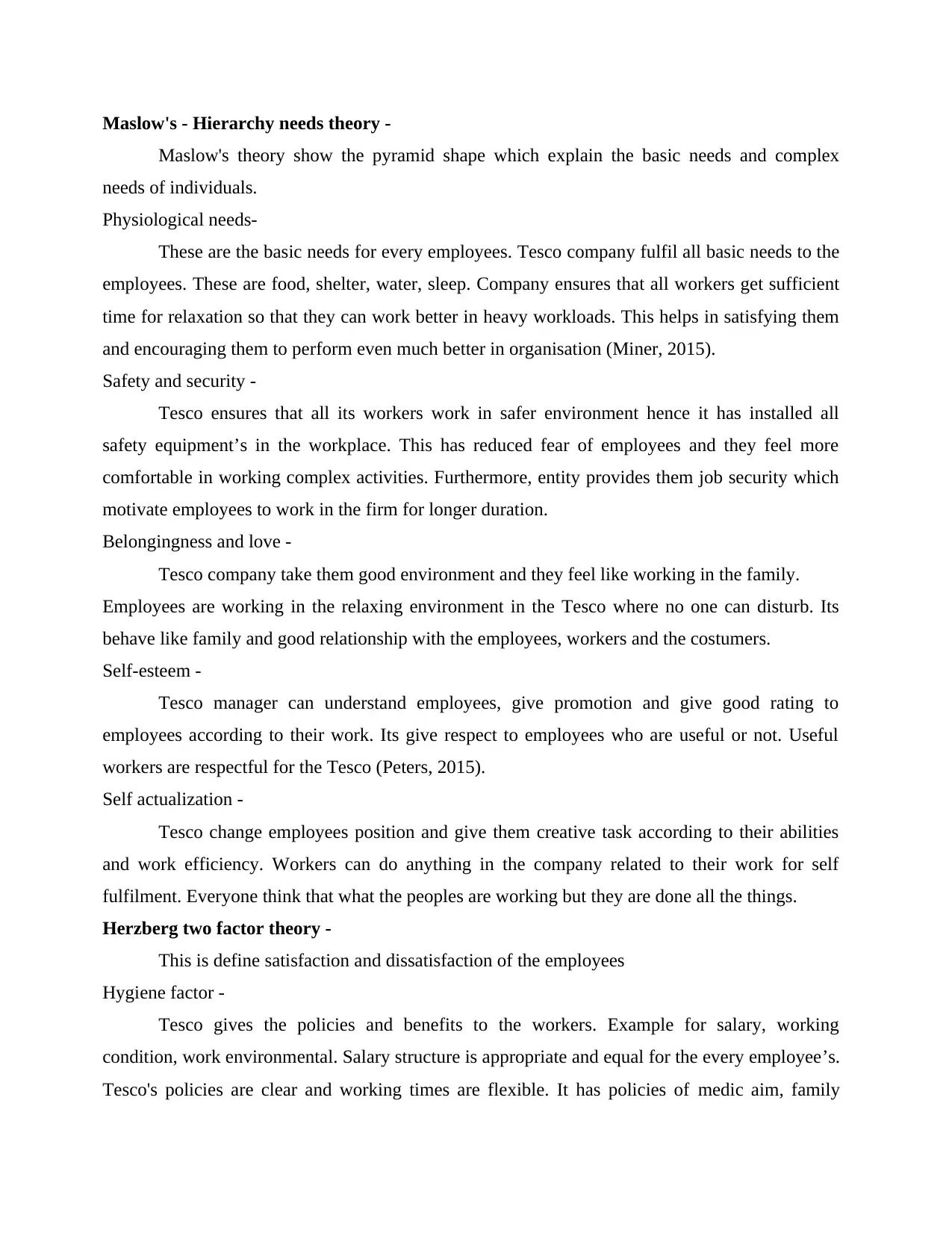
Maslow's - Hierarchy needs theory -
Maslow's theory show the pyramid shape which explain the basic needs and complex
needs of individuals.
Physiological needs-
These are the basic needs for every employees. Tesco company fulfil all basic needs to the
employees. These are food, shelter, water, sleep. Company ensures that all workers get sufficient
time for relaxation so that they can work better in heavy workloads. This helps in satisfying them
and encouraging them to perform even much better in organisation (Miner, 2015).
Safety and security -
Tesco ensures that all its workers work in safer environment hence it has installed all
safety equipment’s in the workplace. This has reduced fear of employees and they feel more
comfortable in working complex activities. Furthermore, entity provides them job security which
motivate employees to work in the firm for longer duration.
Belongingness and love -
Tesco company take them good environment and they feel like working in the family.
Employees are working in the relaxing environment in the Tesco where no one can disturb. Its
behave like family and good relationship with the employees, workers and the costumers.
Self-esteem -
Tesco manager can understand employees, give promotion and give good rating to
employees according to their work. Its give respect to employees who are useful or not. Useful
workers are respectful for the Tesco (Peters, 2015).
Self actualization -
Tesco change employees position and give them creative task according to their abilities
and work efficiency. Workers can do anything in the company related to their work for self
fulfilment. Everyone think that what the peoples are working but they are done all the things.
Herzberg two factor theory -
This is define satisfaction and dissatisfaction of the employees
Hygiene factor -
Tesco gives the policies and benefits to the workers. Example for salary, working
condition, work environmental. Salary structure is appropriate and equal for the every employee’s.
Tesco's policies are clear and working times are flexible. It has policies of medic aim, family
Maslow's theory show the pyramid shape which explain the basic needs and complex
needs of individuals.
Physiological needs-
These are the basic needs for every employees. Tesco company fulfil all basic needs to the
employees. These are food, shelter, water, sleep. Company ensures that all workers get sufficient
time for relaxation so that they can work better in heavy workloads. This helps in satisfying them
and encouraging them to perform even much better in organisation (Miner, 2015).
Safety and security -
Tesco ensures that all its workers work in safer environment hence it has installed all
safety equipment’s in the workplace. This has reduced fear of employees and they feel more
comfortable in working complex activities. Furthermore, entity provides them job security which
motivate employees to work in the firm for longer duration.
Belongingness and love -
Tesco company take them good environment and they feel like working in the family.
Employees are working in the relaxing environment in the Tesco where no one can disturb. Its
behave like family and good relationship with the employees, workers and the costumers.
Self-esteem -
Tesco manager can understand employees, give promotion and give good rating to
employees according to their work. Its give respect to employees who are useful or not. Useful
workers are respectful for the Tesco (Peters, 2015).
Self actualization -
Tesco change employees position and give them creative task according to their abilities
and work efficiency. Workers can do anything in the company related to their work for self
fulfilment. Everyone think that what the peoples are working but they are done all the things.
Herzberg two factor theory -
This is define satisfaction and dissatisfaction of the employees
Hygiene factor -
Tesco gives the policies and benefits to the workers. Example for salary, working
condition, work environmental. Salary structure is appropriate and equal for the every employee’s.
Tesco's policies are clear and working times are flexible. It has policies of medic aim, family
Paraphrase This Document
Need a fresh take? Get an instant paraphrase of this document with our AI Paraphraser
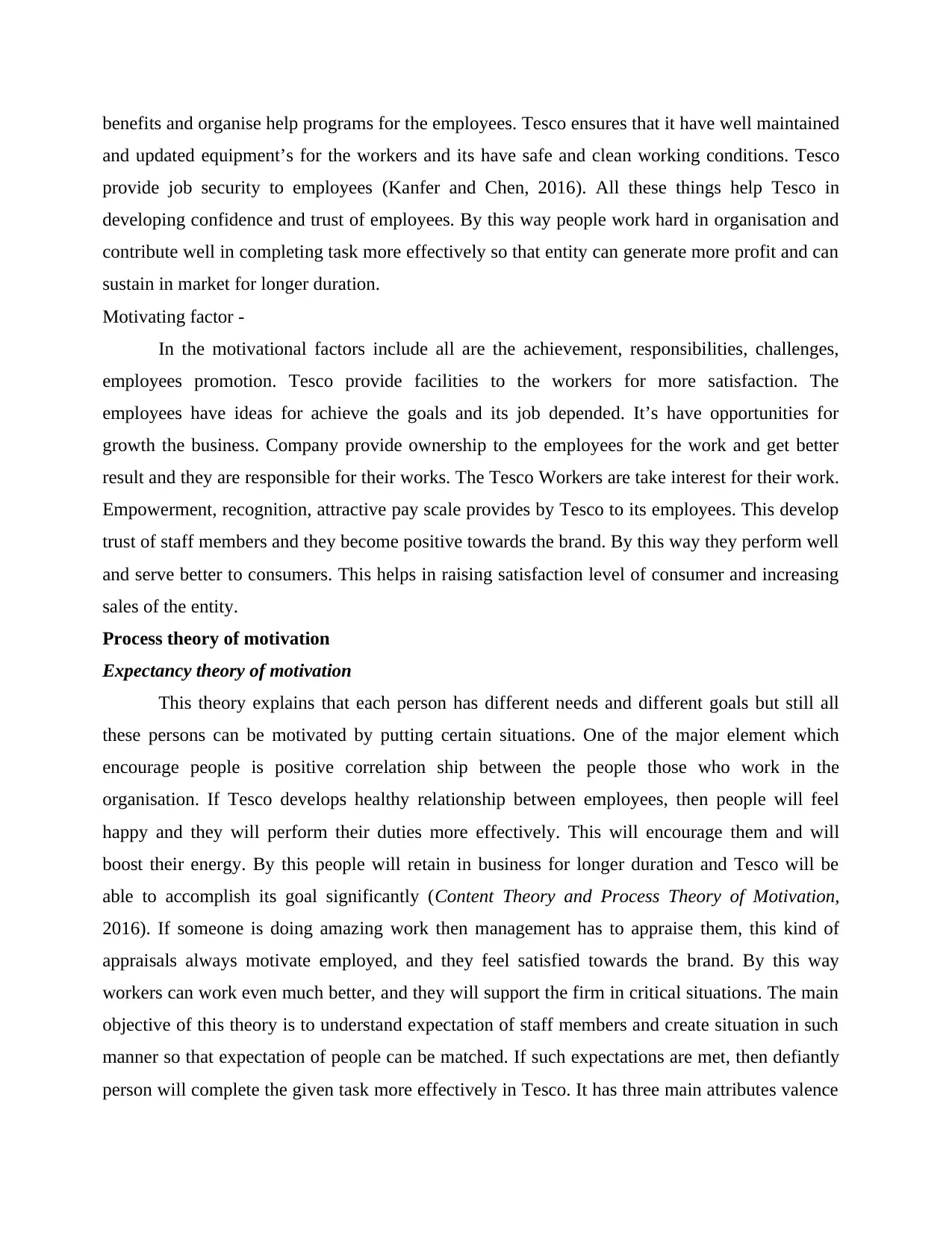
benefits and organise help programs for the employees. Tesco ensures that it have well maintained
and updated equipment’s for the workers and its have safe and clean working conditions. Tesco
provide job security to employees (Kanfer and Chen, 2016). All these things help Tesco in
developing confidence and trust of employees. By this way people work hard in organisation and
contribute well in completing task more effectively so that entity can generate more profit and can
sustain in market for longer duration.
Motivating factor -
In the motivational factors include all are the achievement, responsibilities, challenges,
employees promotion. Tesco provide facilities to the workers for more satisfaction. The
employees have ideas for achieve the goals and its job depended. It’s have opportunities for
growth the business. Company provide ownership to the employees for the work and get better
result and they are responsible for their works. The Tesco Workers are take interest for their work.
Empowerment, recognition, attractive pay scale provides by Tesco to its employees. This develop
trust of staff members and they become positive towards the brand. By this way they perform well
and serve better to consumers. This helps in raising satisfaction level of consumer and increasing
sales of the entity.
Process theory of motivation
Expectancy theory of motivation
This theory explains that each person has different needs and different goals but still all
these persons can be motivated by putting certain situations. One of the major element which
encourage people is positive correlation ship between the people those who work in the
organisation. If Tesco develops healthy relationship between employees, then people will feel
happy and they will perform their duties more effectively. This will encourage them and will
boost their energy. By this people will retain in business for longer duration and Tesco will be
able to accomplish its goal significantly (Content Theory and Process Theory of Motivation,
2016). If someone is doing amazing work then management has to appraise them, this kind of
appraisals always motivate employed, and they feel satisfied towards the brand. By this way
workers can work even much better, and they will support the firm in critical situations. The main
objective of this theory is to understand expectation of staff members and create situation in such
manner so that expectation of people can be matched. If such expectations are met, then defiantly
person will complete the given task more effectively in Tesco. It has three main attributes valence
and updated equipment’s for the workers and its have safe and clean working conditions. Tesco
provide job security to employees (Kanfer and Chen, 2016). All these things help Tesco in
developing confidence and trust of employees. By this way people work hard in organisation and
contribute well in completing task more effectively so that entity can generate more profit and can
sustain in market for longer duration.
Motivating factor -
In the motivational factors include all are the achievement, responsibilities, challenges,
employees promotion. Tesco provide facilities to the workers for more satisfaction. The
employees have ideas for achieve the goals and its job depended. It’s have opportunities for
growth the business. Company provide ownership to the employees for the work and get better
result and they are responsible for their works. The Tesco Workers are take interest for their work.
Empowerment, recognition, attractive pay scale provides by Tesco to its employees. This develop
trust of staff members and they become positive towards the brand. By this way they perform well
and serve better to consumers. This helps in raising satisfaction level of consumer and increasing
sales of the entity.
Process theory of motivation
Expectancy theory of motivation
This theory explains that each person has different needs and different goals but still all
these persons can be motivated by putting certain situations. One of the major element which
encourage people is positive correlation ship between the people those who work in the
organisation. If Tesco develops healthy relationship between employees, then people will feel
happy and they will perform their duties more effectively. This will encourage them and will
boost their energy. By this people will retain in business for longer duration and Tesco will be
able to accomplish its goal significantly (Content Theory and Process Theory of Motivation,
2016). If someone is doing amazing work then management has to appraise them, this kind of
appraisals always motivate employed, and they feel satisfied towards the brand. By this way
workers can work even much better, and they will support the firm in critical situations. The main
objective of this theory is to understand expectation of staff members and create situation in such
manner so that expectation of people can be matched. If such expectations are met, then defiantly
person will complete the given task more effectively in Tesco. It has three main attributes valence
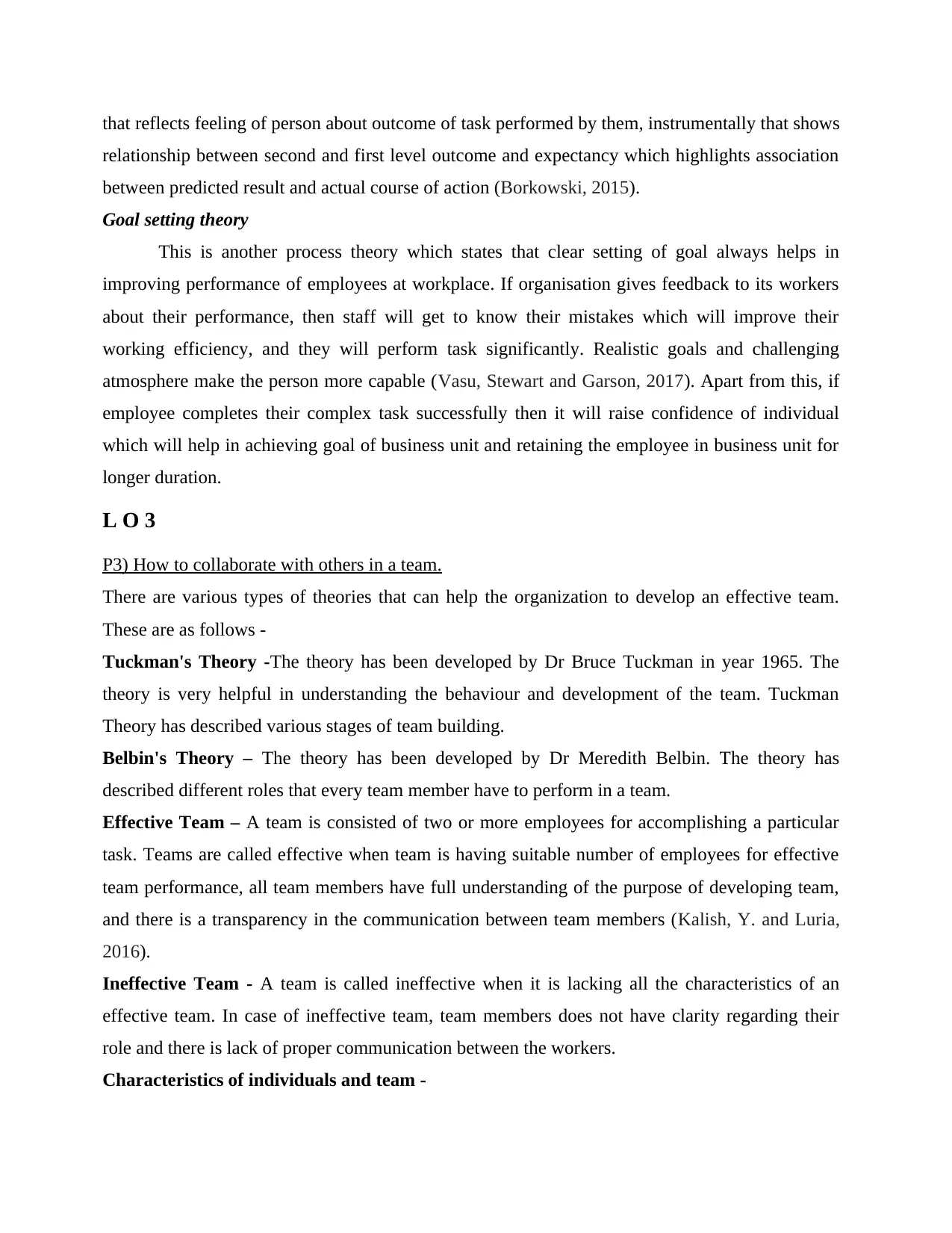
that reflects feeling of person about outcome of task performed by them, instrumentally that shows
relationship between second and first level outcome and expectancy which highlights association
between predicted result and actual course of action (Borkowski, 2015).
Goal setting theory
This is another process theory which states that clear setting of goal always helps in
improving performance of employees at workplace. If organisation gives feedback to its workers
about their performance, then staff will get to know their mistakes which will improve their
working efficiency, and they will perform task significantly. Realistic goals and challenging
atmosphere make the person more capable (Vasu, Stewart and Garson, 2017). Apart from this, if
employee completes their complex task successfully then it will raise confidence of individual
which will help in achieving goal of business unit and retaining the employee in business unit for
longer duration.
L O 3
P3) How to collaborate with others in a team.
There are various types of theories that can help the organization to develop an effective team.
These are as follows -
Tuckman's Theory -The theory has been developed by Dr Bruce Tuckman in year 1965. The
theory is very helpful in understanding the behaviour and development of the team. Tuckman
Theory has described various stages of team building.
Belbin's Theory – The theory has been developed by Dr Meredith Belbin. The theory has
described different roles that every team member have to perform in a team.
Effective Team – A team is consisted of two or more employees for accomplishing a particular
task. Teams are called effective when team is having suitable number of employees for effective
team performance, all team members have full understanding of the purpose of developing team,
and there is a transparency in the communication between team members (Kalish, Y. and Luria,
2016).
Ineffective Team - A team is called ineffective when it is lacking all the characteristics of an
effective team. In case of ineffective team, team members does not have clarity regarding their
role and there is lack of proper communication between the workers.
Characteristics of individuals and team -
relationship between second and first level outcome and expectancy which highlights association
between predicted result and actual course of action (Borkowski, 2015).
Goal setting theory
This is another process theory which states that clear setting of goal always helps in
improving performance of employees at workplace. If organisation gives feedback to its workers
about their performance, then staff will get to know their mistakes which will improve their
working efficiency, and they will perform task significantly. Realistic goals and challenging
atmosphere make the person more capable (Vasu, Stewart and Garson, 2017). Apart from this, if
employee completes their complex task successfully then it will raise confidence of individual
which will help in achieving goal of business unit and retaining the employee in business unit for
longer duration.
L O 3
P3) How to collaborate with others in a team.
There are various types of theories that can help the organization to develop an effective team.
These are as follows -
Tuckman's Theory -The theory has been developed by Dr Bruce Tuckman in year 1965. The
theory is very helpful in understanding the behaviour and development of the team. Tuckman
Theory has described various stages of team building.
Belbin's Theory – The theory has been developed by Dr Meredith Belbin. The theory has
described different roles that every team member have to perform in a team.
Effective Team – A team is consisted of two or more employees for accomplishing a particular
task. Teams are called effective when team is having suitable number of employees for effective
team performance, all team members have full understanding of the purpose of developing team,
and there is a transparency in the communication between team members (Kalish, Y. and Luria,
2016).
Ineffective Team - A team is called ineffective when it is lacking all the characteristics of an
effective team. In case of ineffective team, team members does not have clarity regarding their
role and there is lack of proper communication between the workers.
Characteristics of individuals and team -
⊘ This is a preview!⊘
Do you want full access?
Subscribe today to unlock all pages.

Trusted by 1+ million students worldwide
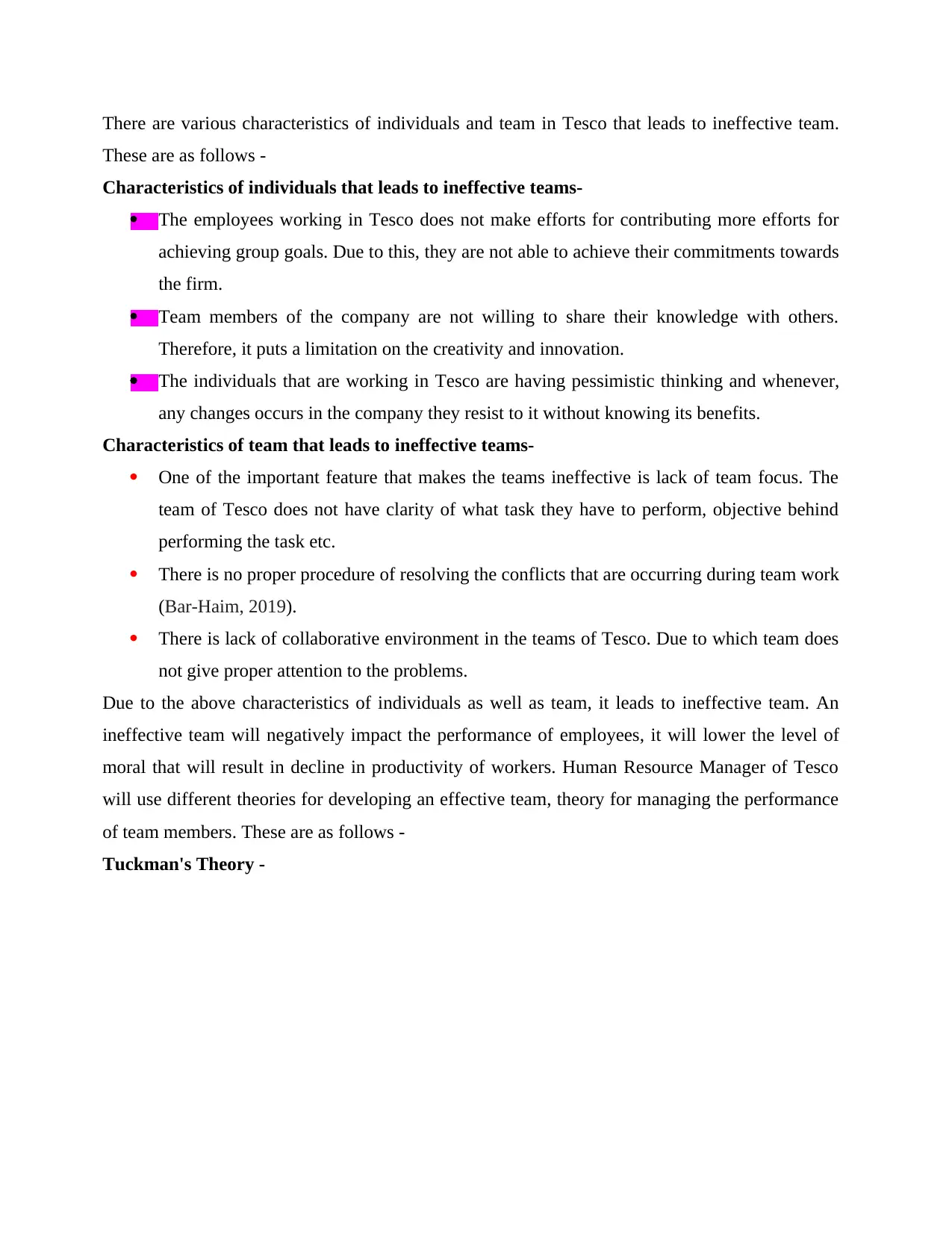
There are various characteristics of individuals and team in Tesco that leads to ineffective team.
These are as follows -
Characteristics of individuals that leads to ineffective teams-
The employees working in Tesco does not make efforts for contributing more efforts for
achieving group goals. Due to this, they are not able to achieve their commitments towards
the firm.
Team members of the company are not willing to share their knowledge with others.
Therefore, it puts a limitation on the creativity and innovation.
The individuals that are working in Tesco are having pessimistic thinking and whenever,
any changes occurs in the company they resist to it without knowing its benefits.
Characteristics of team that leads to ineffective teams-
One of the important feature that makes the teams ineffective is lack of team focus. The
team of Tesco does not have clarity of what task they have to perform, objective behind
performing the task etc.
There is no proper procedure of resolving the conflicts that are occurring during team work
(Bar-Haim, 2019).
There is lack of collaborative environment in the teams of Tesco. Due to which team does
not give proper attention to the problems.
Due to the above characteristics of individuals as well as team, it leads to ineffective team. An
ineffective team will negatively impact the performance of employees, it will lower the level of
moral that will result in decline in productivity of workers. Human Resource Manager of Tesco
will use different theories for developing an effective team, theory for managing the performance
of team members. These are as follows -
Tuckman's Theory -
These are as follows -
Characteristics of individuals that leads to ineffective teams-
The employees working in Tesco does not make efforts for contributing more efforts for
achieving group goals. Due to this, they are not able to achieve their commitments towards
the firm.
Team members of the company are not willing to share their knowledge with others.
Therefore, it puts a limitation on the creativity and innovation.
The individuals that are working in Tesco are having pessimistic thinking and whenever,
any changes occurs in the company they resist to it without knowing its benefits.
Characteristics of team that leads to ineffective teams-
One of the important feature that makes the teams ineffective is lack of team focus. The
team of Tesco does not have clarity of what task they have to perform, objective behind
performing the task etc.
There is no proper procedure of resolving the conflicts that are occurring during team work
(Bar-Haim, 2019).
There is lack of collaborative environment in the teams of Tesco. Due to which team does
not give proper attention to the problems.
Due to the above characteristics of individuals as well as team, it leads to ineffective team. An
ineffective team will negatively impact the performance of employees, it will lower the level of
moral that will result in decline in productivity of workers. Human Resource Manager of Tesco
will use different theories for developing an effective team, theory for managing the performance
of team members. These are as follows -
Tuckman's Theory -
Paraphrase This Document
Need a fresh take? Get an instant paraphrase of this document with our AI Paraphraser
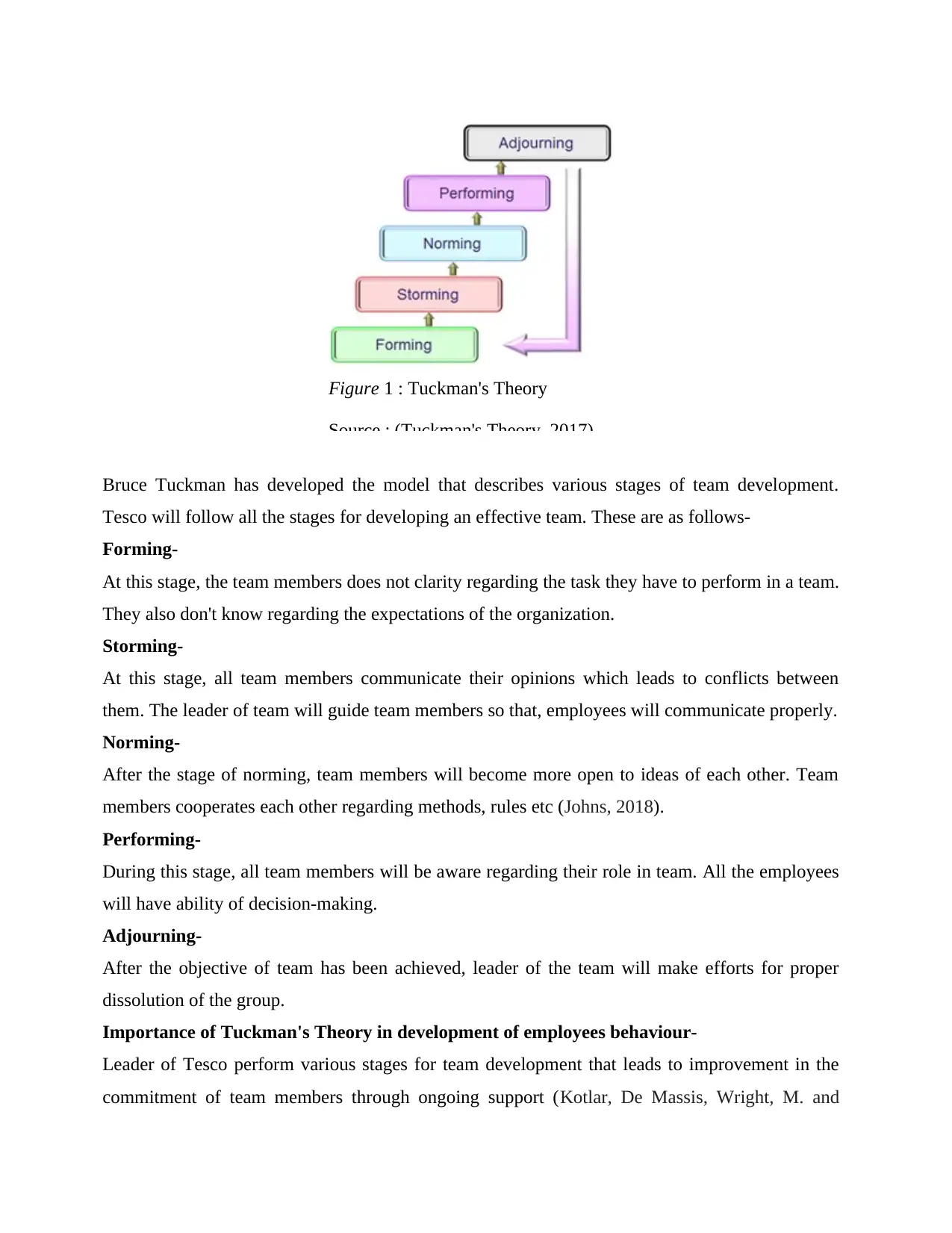
Bruce Tuckman has developed the model that describes various stages of team development.
Tesco will follow all the stages for developing an effective team. These are as follows-
Forming-
At this stage, the team members does not clarity regarding the task they have to perform in a team.
They also don't know regarding the expectations of the organization.
Storming-
At this stage, all team members communicate their opinions which leads to conflicts between
them. The leader of team will guide team members so that, employees will communicate properly.
Norming-
After the stage of norming, team members will become more open to ideas of each other. Team
members cooperates each other regarding methods, rules etc (Johns, 2018).
Performing-
During this stage, all team members will be aware regarding their role in team. All the employees
will have ability of decision-making.
Adjourning-
After the objective of team has been achieved, leader of the team will make efforts for proper
dissolution of the group.
Importance of Tuckman's Theory in development of employees behaviour-
Leader of Tesco perform various stages for team development that leads to improvement in the
commitment of team members through ongoing support (Kotlar, De Massis, Wright, M. and
Figure 1 : Tuckman's Theory
Source : (Tuckman's Theory, 2017)
Tesco will follow all the stages for developing an effective team. These are as follows-
Forming-
At this stage, the team members does not clarity regarding the task they have to perform in a team.
They also don't know regarding the expectations of the organization.
Storming-
At this stage, all team members communicate their opinions which leads to conflicts between
them. The leader of team will guide team members so that, employees will communicate properly.
Norming-
After the stage of norming, team members will become more open to ideas of each other. Team
members cooperates each other regarding methods, rules etc (Johns, 2018).
Performing-
During this stage, all team members will be aware regarding their role in team. All the employees
will have ability of decision-making.
Adjourning-
After the objective of team has been achieved, leader of the team will make efforts for proper
dissolution of the group.
Importance of Tuckman's Theory in development of employees behaviour-
Leader of Tesco perform various stages for team development that leads to improvement in the
commitment of team members through ongoing support (Kotlar, De Massis, Wright, M. and
Figure 1 : Tuckman's Theory
Source : (Tuckman's Theory, 2017)
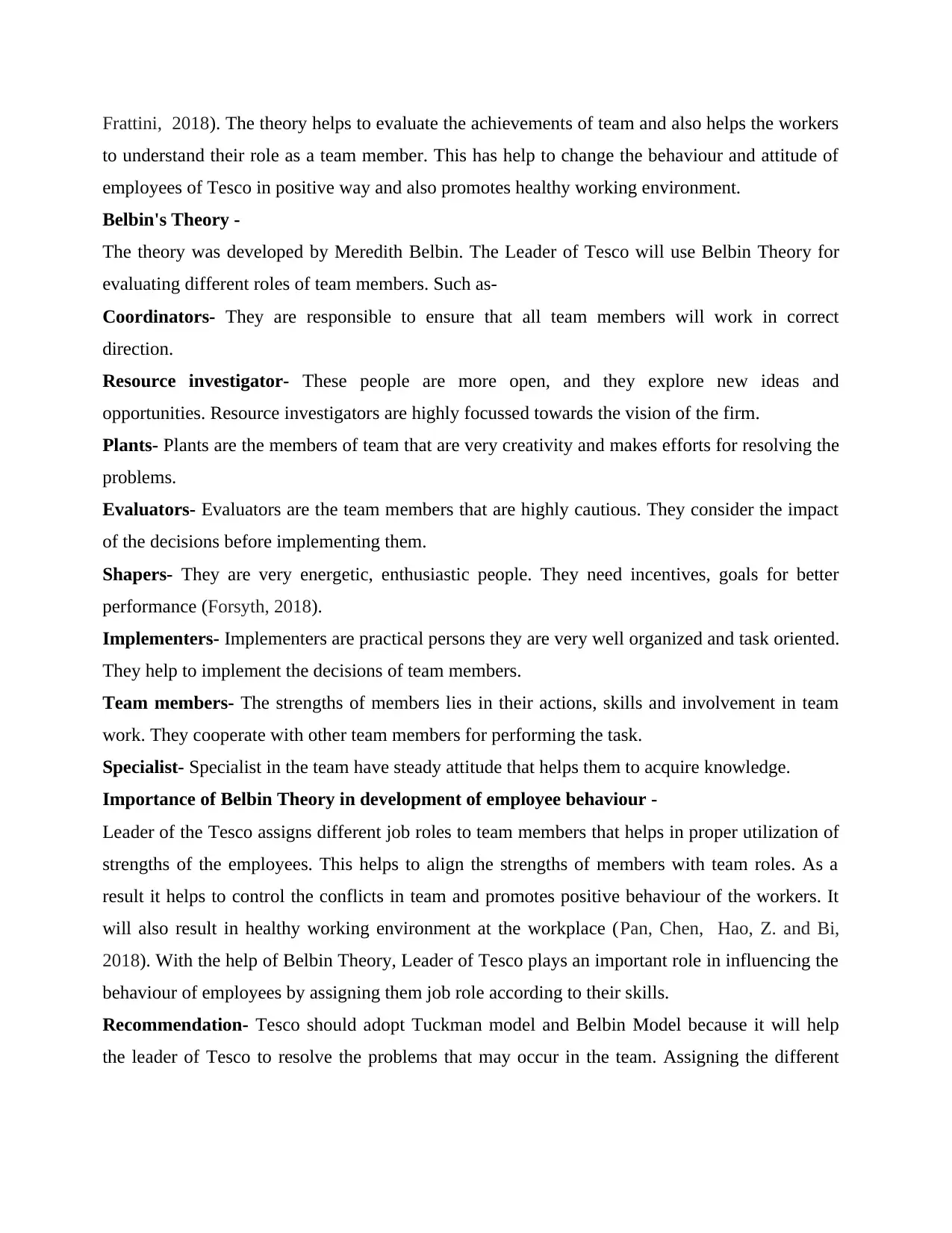
Frattini, 2018). The theory helps to evaluate the achievements of team and also helps the workers
to understand their role as a team member. This has help to change the behaviour and attitude of
employees of Tesco in positive way and also promotes healthy working environment.
Belbin's Theory -
The theory was developed by Meredith Belbin. The Leader of Tesco will use Belbin Theory for
evaluating different roles of team members. Such as-
Coordinators- They are responsible to ensure that all team members will work in correct
direction.
Resource investigator- These people are more open, and they explore new ideas and
opportunities. Resource investigators are highly focussed towards the vision of the firm.
Plants- Plants are the members of team that are very creativity and makes efforts for resolving the
problems.
Evaluators- Evaluators are the team members that are highly cautious. They consider the impact
of the decisions before implementing them.
Shapers- They are very energetic, enthusiastic people. They need incentives, goals for better
performance (Forsyth, 2018).
Implementers- Implementers are practical persons they are very well organized and task oriented.
They help to implement the decisions of team members.
Team members- The strengths of members lies in their actions, skills and involvement in team
work. They cooperate with other team members for performing the task.
Specialist- Specialist in the team have steady attitude that helps them to acquire knowledge.
Importance of Belbin Theory in development of employee behaviour -
Leader of the Tesco assigns different job roles to team members that helps in proper utilization of
strengths of the employees. This helps to align the strengths of members with team roles. As a
result it helps to control the conflicts in team and promotes positive behaviour of the workers. It
will also result in healthy working environment at the workplace (Pan, Chen, Hao, Z. and Bi,
2018). With the help of Belbin Theory, Leader of Tesco plays an important role in influencing the
behaviour of employees by assigning them job role according to their skills.
Recommendation- Tesco should adopt Tuckman model and Belbin Model because it will help
the leader of Tesco to resolve the problems that may occur in the team. Assigning the different
to understand their role as a team member. This has help to change the behaviour and attitude of
employees of Tesco in positive way and also promotes healthy working environment.
Belbin's Theory -
The theory was developed by Meredith Belbin. The Leader of Tesco will use Belbin Theory for
evaluating different roles of team members. Such as-
Coordinators- They are responsible to ensure that all team members will work in correct
direction.
Resource investigator- These people are more open, and they explore new ideas and
opportunities. Resource investigators are highly focussed towards the vision of the firm.
Plants- Plants are the members of team that are very creativity and makes efforts for resolving the
problems.
Evaluators- Evaluators are the team members that are highly cautious. They consider the impact
of the decisions before implementing them.
Shapers- They are very energetic, enthusiastic people. They need incentives, goals for better
performance (Forsyth, 2018).
Implementers- Implementers are practical persons they are very well organized and task oriented.
They help to implement the decisions of team members.
Team members- The strengths of members lies in their actions, skills and involvement in team
work. They cooperate with other team members for performing the task.
Specialist- Specialist in the team have steady attitude that helps them to acquire knowledge.
Importance of Belbin Theory in development of employee behaviour -
Leader of the Tesco assigns different job roles to team members that helps in proper utilization of
strengths of the employees. This helps to align the strengths of members with team roles. As a
result it helps to control the conflicts in team and promotes positive behaviour of the workers. It
will also result in healthy working environment at the workplace (Pan, Chen, Hao, Z. and Bi,
2018). With the help of Belbin Theory, Leader of Tesco plays an important role in influencing the
behaviour of employees by assigning them job role according to their skills.
Recommendation- Tesco should adopt Tuckman model and Belbin Model because it will help
the leader of Tesco to resolve the problems that may occur in the team. Assigning the different
⊘ This is a preview!⊘
Do you want full access?
Subscribe today to unlock all pages.

Trusted by 1+ million students worldwide
1 out of 19
Related Documents
Your All-in-One AI-Powered Toolkit for Academic Success.
+13062052269
info@desklib.com
Available 24*7 on WhatsApp / Email
![[object Object]](/_next/static/media/star-bottom.7253800d.svg)
Unlock your academic potential
Copyright © 2020–2025 A2Z Services. All Rights Reserved. Developed and managed by ZUCOL.





